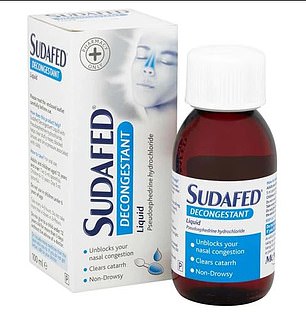A doctor has issued a stark warning to frequent users of decongestant sprays — as they can cause you to become addicted.
The over-the-counter staples, known by brand names like Sudafed and Vicks, contain potent medications which users can become hooked on if used for weeks on end, warned NHS doctor Dr Sooj.
In a clip shared with his 194,000 TikTok followers, the A&E doctor said that within a few days of usage, the time between doses needed to get the easy-breathing effect will ‘reduce and reduce and reduce’.
‘Some people need to use them every hour,’ he said, adding that he is aware of those who ‘literally can’t breathe without it’.
‘Going cold turkey would be ‘probably awful. It’s going to be really hard and horrible. It can lead to months or even a year of just distress.’
Decongestant sprays like Sudafed contain medications such as oxymetazoline, xylometazoline, phenylephrine and pseudoephedrine which help to reduce congestion in the nose by reducing swelling of the blood vessels.
This helps to open the airways in your nostrils, allowing you to breathe more easily.
‘The problem is that once the spray wears off, the blood flow floods back into your nose, and the congestion just comes back much harder and faster,’ Dr Sooj said.
He added that ‘with repeated use’ you’ll find you need to use the drug to breathe normally, even if the congestion from mucus has reduced.
Dr Sooj revealed one method of ‘getting off’ the medicine, which is to ‘stop one nostril at a time’.
‘And then once one nostril is recovered, stop in the other one’.
Alternatively, you could ‘gradually wean yourself off it’, he said, advising that patients may wish to try alternative medications to ‘try and help it move along’, such as nasal steroids.
These medicines ‘might be able to just help reduce the inflammation in your nose,’ he said.

Sudafed sprays for blocked noses cost around £5 at Boots. But experts have warned of the dangers.
‘And then there are other things that we can also prescribe. But if you have any concerns go and see a doctor.’
When it comes to over-the-counter cold and flu remedies, Brits have fewer options than they used to.
Last year, health chiefs urgently pulled 20 different cold and flu remedies from shelves over fears they could trigger deadly allergic reactions.
The medicines regulator ruled that products containing pholcodine — which was found in some Day and Night Nurse products — raised the risk of life-threatening anaphylaxis among patients put under general anaesthetic.
Experts instead recommend steam inhalation — hovering over a bowl of hot water and covering your head with a towel — to help cold and flu symptoms, as well as lozenges, honey and a linctus cough syrup.
This article was originally published by a www.dailymail.co.uk . Read the Original article here. .


